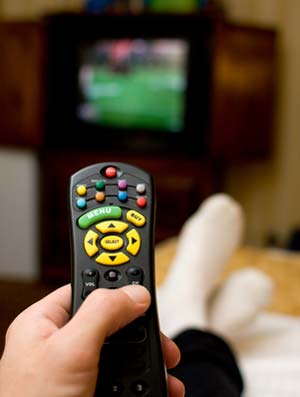Surprising Health Benefits Related to Watching Sports on TV
By Toni Keller
In the past, your penchant for the NFL was viewed as an inherently unhealthy indulgence. After all, those sessions in front of the boob tube involved couch potato behavior, not to mention plenty of beer and pizza. But given its continued presence at the top of Nielsen's most-watched TV programming, NFL broadcasts remain a popular means of killing time on lazy Sundays.
And according to the latest research, sports viewership may not be such a health risk after all. Benefits range from social connection to measurable increases in muscle nerve activity and everything in between.
Reduced Risk of Depression
Yes, you might spend the evening moping after your favorite team is ripped to shreds, but the long-term result of your athletic viewing habit may actually involve improved mental well-being. This is particularly true if you're a social football viewer, as the increased interaction related to football viewing house parties and bar sessions actually go a long way in building the bonds necessary to maintain a healthy social life.
Sports psychologist Elizabeth Tindle tells ABC that in fostering a sense of belonging, watching sports with friends and family prevents the sense of isolation that often precedes strong cases of clinical depression. And as www.bundle.tv points out, even when you're viewing a game by yourself you can still do so as part of a community with the assistance of mobile devices and social media.
Brain Workout

The athletic dunce stereotype is completely unfair because while some sports fans definitely prize brawn over brains, an in-depth look at statistics requires a fair amount of brain power. But even if you neglect the mathematical aspect of athletics, the mere act of watching that weekly football game could improve your mental capacity.
According to a University of Chicago study, individuals participating in the sports experience, including watching games on television and talking about them with friends, see improved neural connections related to linguistic ability and comprehension. Athletes experience the exact same increases in brain activity, which perhaps explains why a simple sports fan can be just as well-versed in the associated terminology as the professional athletes he or she watches on television.
Muscle Nerve Activity
If you've ever really gotten into a game and then later felt completely exhausted, you aren't simply suffering the mental strain of an athletic performance gone wrong. You actually managed to give your body a decent workout. As a study published in the "Archives Italiennes de Biologie" found, increased muscle activity during passive viewing is possible, as long as the content portrays physical activity. In the "Archives" report, viewers merely watching fast-paced walkers experienced increases in blood pressure, heart rate and muscle nerve activity.
In a related "Frontiers" study, researchers found that these physical benefits could easily be enhanced by asking viewers to imagine that they were taking part in the activity in question. The same concept is believed to apply to alternative forms of athletic activity. Although the standard NFL fan might not necessarily put himself in the shoes of Aaron Rodgers or Adrian Peterson, doing so could very well result in physical health benefits.
What do you think?
We'd love to hear your comments and/or opinions. If you submit them here, other visitors can read them, rate them and comment on them. An e-mail address is not required.
Surprising Health Benefits Related to Watching Sports on TV to Other Sports






New! Facebook Comments
Leave a comment about this article in the box below and share it with your Facebook friends.